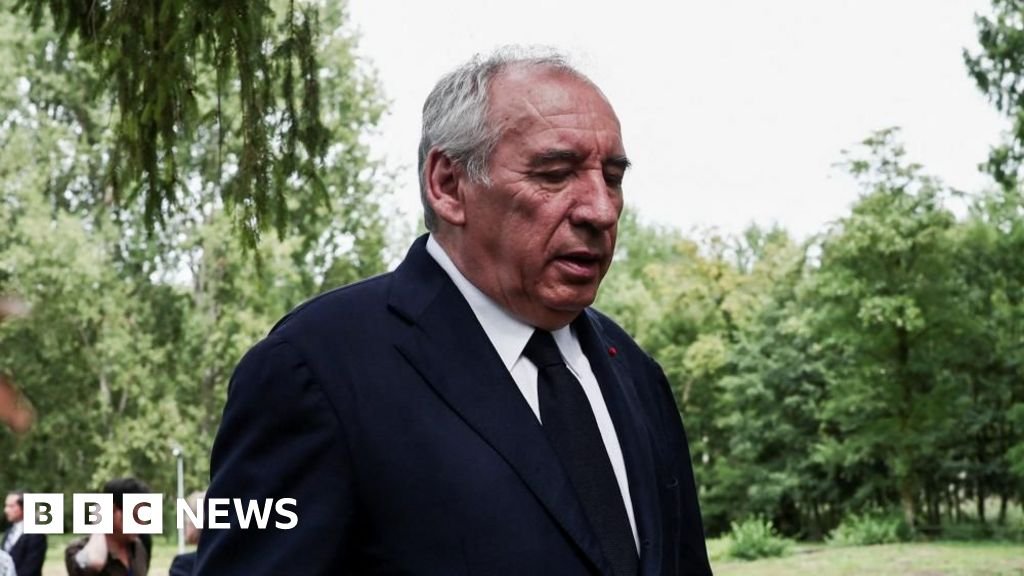Top Stories
France heads for political crisis as PM Bayrou risks all on confidence vote

France is on the brink of another political crisis, after Prime Minister François Bayrou’s shock decision to submit his government to a vote of confidence in parliament.
The chances of his winning the vote in a special session of the National Assembly on September 8 being extremely slim, the prime minister’s days in office look numbered.
If the vote is lost, Bayrou will be expected to resign, leaving France once again rudderless at a time of immense economic, social and geopolitical uncertainty.
For the second time inside a year, the disastrous effects of President Emmanuel Macron’s hasty parliamentary dissolution of July 2024 threaten institutional chaos and even civil unrest.
Far from offering the “clarity” that Macron wanted after his defeat in European polls in June 2024, the newly elected National Assembly was split three ways between centrists, the populist right, and the left – meaning that no government of any stripe could hope for a majority.
Macron himself was cut out of domestic politics and forced to focus on international affairs.
The first post-dissolution prime minister, Michel Barnier, struggled on until December, but then was brought down when the opposition parties combined against his budget.
And now exactly the same thing seems about to happen to his replacement.
The only difference is that Bayrou is refusing to go through the same agony of three months of ultimately fruitless debate in parliament. Like a desperate gambler, he is staking the house on an initial vote of confidence.
If he wins, it will be a spectacular vindication of his apocalyptic strategy, warning – like a lone prophetic voice – of the existential threat to France if it fails to take back control of its debt.
The trouble is no-one expects him to win the vote. Least of all, probably, he himself.
The numbers are easy to count.
The four pro-government groups in the Assembly have 210 deputies between them. The oppositions – of left and right – have between them 353.
For Bayrou to have any chance, he would need either the Socialist bloc (66 seats) or Marine Le Pen’s National Rally (123) to make a move. If National Rally abstained, it would make for a tight vote that might just be winnable if a few smaller groups did the same.
But if Bayrou is looking to the Socialists, they would have to vote for the government to make any difference. And that is not going to happen.
Indeed the whole question is looking increasingly academic as opposition leader after opposition leader has made it clear in the last 24 hours that they are not in any way minded to rescue the beleaguered PM.
Perhaps Bayrou has his eye rather on the country as a whole.
Maybe he wants to go down in history as the man who, Cassandra-like, foretold France’s death-by-debt but was never believed. Or perhaps he is pondering the 2027 presidential election, and hopes that by then voters will realise he was right all along.
Sadly for him, though, there is no sign of the French changing their mind on debt. In their vast majority, they simply do not think the issue is as urgent as Bayrou says it is. Or if they do, they can’t see why ordinary folks like them should suffer for it.
Even before this latest twist, the country was shaping up for a dramatic autumn – with a grassroots protest movement called Bloquons Tout (Let’s Block Everything) earning comparisons with the Gilets Jaunes (Yellow Vests) who so disrupted Macron’s first mandate as president.
Fired up by Bayrou’s plans to axe two public holidays and freeze public spending, the movement announced a day of action on 10 September, for which it now has the support of far-left leader Jean-Luc Melenchon. Unions are planning separate actions against government “austerity”.
Of course if the government has fallen on 8 September, then the need for such protest may have evaporated. And the country will have other, more pressing, problems on its mind.
What happens if the government does fall is hard to predict.
There will certainly be more calls for Macron to resign, which he will almost certainly resist. Presumably he will start by trying to find another prime minister, but after the loss of both Barnier and Bayrou who would take the plunge?
Marine Le Pen is leading calls for a new dissolution of the National Assembly, which under the constitution is now possible. No second dissolution was allowed within a year of the first which meant that until July there was no way out of the parliamentary impasse.
But it is highly unlikely new elections would improve the position of the centrist bloc which is loyal(-ish) to Macron. More probably it would reinforce the populist right, though the most likely scenario of all is yet another three-way blockage.
In such circumstances the country appears condemned to more domestic drift and deferred decisions.
It could hardly come at a worse time, as Europe and the West face big questions over security, immigration, debt and the rising costs of their post-World War Two welfare states.
President Macron’s final 18 months in office look like being a sad parody of the hopeful era he so proudly announced back in 2017.
Top Stories
Top Democrat says intelligence briefing cancelled after attacks by far-right Laura Loomer | US politics

Senator Mark Warner said on Wednesday that a meeting he had scheduled at the headquarters of a US intelligence agency was cancelled following online attacks by the far-right activist and conspiracy theorist Laura Loomer.
Warner, the Democratic vice-chair of the Senate intelligence committee, was set to visit the National Geospatial-Intelligence Agency in Virginia in what he described part of his “responsibility to provide oversight and support to our intelligence community”.
The administration rescinded the invitation after Loomer initiated a “campaign of baseless attacks” against him and the agency’s director, Trey Whitworth, he said.
“I can’t overstate how unprecedented and dangerous this is,” Warner said in a fundraising email. “This administration is taking its marching orders from Laura Loomer – a wackjob with a long history of outlandish fringe views, including 9/11 denialism, anti-Muslim harassment campaigns, and associations with white supremacists.”
Loomer posted on social media in recent days complaining that the director of an intelligence agency was hosting a “rabid ANTI-TRUMP DEMOCRAT SENATOR”. She celebrated the cancellation, calling Warner a threat to national security and arguing he should be removed from the Senate committee.
“He weaponized our intelligence agencies to push the debunked Russia Collusion Hoax,” she wrote.
She told the New York Times Warner should “be removed from office and tried for treason”.
Warner told reporters that the decision to cancel the previously unpublicized meeting was made by the office of the defense secretary.
The incident illustrates Loomer’s enduring influence within Donald Trump’s administration. The 32-year-old, who has previously described herself as “a proud Islamophobe”, has acted as a national security and foreign policy adviser to the president. In April, Trump fired six staffers after Loomer gave him a list of people she believed were not sufficiently loyal to the president.
Last month, the administration announced it was planning to stop issuing visas to children from Gaza seeking medical care after complaints from Loomer.
Warner argued that Loomer is “basically a cabinet member at this point” and that Trump and his administration were “caving to whatever she wants”.
“This nakedly political decision undermines the dedicated, nonpartisan staff at [the] NGA and threatens the principle of civilian oversight that protects our national security,” Warner said in a statement.
“Members of Congress routinely conduct meetings and on-site engagements with federal employees in their states and districts; blocking and setting arbitrary conditions on these sessions sets a dangerous precedent, calling into question whether oversight is now allowed only when it pleases the far-right fringe.”
Top Stories
Old master painting looted by Nazis recovered a week after being spotted in Argentinian property listing | Nazism

Authorities in Argentina have recovered an 18th-century painting stolen more than 80 years ago by the Nazis from a Jewish art dealer in Amsterdam, a week after it was spotted by chance in a real estate listing.
The painting, the long-lost Portrait of a Lady (Contessa Colleoni) by the Italian master Giuseppe Ghislandi, was looted in the second world war. It was handed over on Wednesday to the Argentinian judiciary by the daughter of the late Nazi financier Friedrich Kadgien, Patricia Kadgien, who has been under house arrest with her husband since Tuesday.
Prosecutors allege the couple tried to conceal the stolen artwork. They face a hearing on Thursday on charges of concealment and obstruction of justice. The Guardian contacted her legal representatives, who declined to comment.
The Dutch newspaper AD traced the painting after a years-long investigation that took a breakthrough turn last week when one of its reporters found Kadgien’s house in an online property listing in the seaside city of Mar del Plata.
A photo in the listing showed the missing artwork – last seen in 1946 and belonging to the Dutch Jewish art dealer Jacques Goudstikker – hanging above a sofa in the couple’s living room. AD published its findings on 25 August.
The next day, federal prosecutor Carlos Martínez ordered a raid on the property, but the painting was no longer there. Police seized two unlicensed firearms and two mobile phones.
Four additional raids on Monday uncovered two other paintings that experts believe could date back to the 19th century, along with several drawings and engravings. The judiciary is analysing the works to determine whether they, too, were looted during the second world war.
A federal court in Mar del Plata placed Kadgien and her husband under 72-hour house arrest on Tuesday.
After the fall of the Third Reich at the end of the second world war, several high-ranking Nazi officials fled to South America.
Friedrich Kadgien was among them. He fled the Netherlands in 1946, first to Switzerland, then Brazil, and finally to Argentina, where he had two daughters. The painting is believed to have accompanied him and to have remained in his family’s possession after he died in Buenos Aires in 1978.
The portrait was among more than 1,000 works of art stolen by the Nazis from Goudstikker, who died in 1940 after falling in the hold of the ship carrying him to safety.
Goudstikker’s heirs plan to reclaim the painting, AD reported.
Top Stories
Florida plans to become first state to ban all vaccine requirements

 Getty Images
Getty ImagesFlorida is aiming to become the first US state to cancel all of its vaccine mandates, many of which require children to get jabs against diseases like polio in order to attend public schools.
The state’s top health official, Florida Surgeon General Joseph Ladapo, likened the mandates to “slavery”, in announcing the plans.
“Who am I to tell you what your child should put in your body?” he said. “I don’t have that right. Your body is a gift from God.”
Florida officials did not give a timeline or details on ending the mandates. Several may only be repealed through a vote by the Republican-led state legislature, while others can be scrapped by the state health department.
Ladapo, though, pledged several times during Wednesday’s news conference to end “all of them, every last one of them”.
The surgeon general has been frequently criticised by doctors and health groups, who say he has spread misinformation.
Democratic state lawmaker Anna Eskamani was among those criticising the plan to end all mandates, decrying it as “reckless and dangerous”.
“This is a public health disaster in the making for the Sunshine State,” she posted on X.
While every state requires children to be vaccinated in order to attend public schools, each one has different policies about giving exemptions to the mandates.
Idaho, another Republican-dominated state, loosened many of its rules on vaccines earlier this year, but still requires children to be immunised.
In Florida, students are currently required to be vaccinated against multiple illnesses, including chicken pox, hepatitis B, measles, mumps and polio.
The Florida Education Association, a group representing more than 120,000 school teachers and administrators, also condemned the move, saying health officials are discussing “disrupting student learning and making schools less safe”.
“State leaders say they care about reducing chronic absenteeism and keeping kids in school – but reducing vaccinations does the opposite, putting our children’s health and education at risk,” the statement said.
 Getty Images
Getty ImagesAccording to the World Health Organization, vaccines have saved at least 154 million lives – mostly infants – in the past 50 years.
The US Centers for Disease Control and Prevention (CDC) says that about four million deaths are prevented worldwide each year by childhood vaccinations.
Dr Debra Houry, who resigned in protest last week from her post as the CDC’s chief medical officer, told the BBC that the move in Florida could lead to outbreaks of several preventable diseases among students.
She noted that about 270 children in the US died from influenza this past flu season, and about 90% of those children were unvaccinated, “so vaccines are really important to prevent kids from having these significant diseases”.
Dr Nahid Bhadelia, director of the Boston University Center on Emerging Infectious Diseases, added: “It’s particularly unfortunate for Florida because its such a big travel hub. They have people coming and going from Florida all over the world.”
Dr Bhadelia, who also advised the White House during the Covid pandemic, also told the BBC that the decision may lead to fewer insurance providers covering the cost of the immunisations, leading to increased danger for at-risk adults such as pregnant women.
On Wednesday, a group of Democratic-led states announced they had created an alliance to co-ordinate on health matters, including immunisations, in opposition to the Trump administration’s overhaul and changes to public health programmes and guidance.
The governors of Washington, Oregon and California said they would use guidance from national medical organisations, many of which have rejected the Trump administration’s changes to childhood vaccinations, and lean less on advice from the federal government.
In a joint press release they said Trump was “dismantling” the CDC, and blasted the recent decision by US Health Secretary Robert F Kennedy Jr – a vaccine sceptic – to remove experts from the CDC’s vaccine advisory panel.
-

 Business5 days ago
Business5 days agoThe Guardian view on Trump and the Fed: independence is no substitute for accountability | Editorial
-
Tools & Platforms3 weeks ago
Building Trust in Military AI Starts with Opening the Black Box – War on the Rocks
-

 Ethics & Policy1 month ago
Ethics & Policy1 month agoSDAIA Supports Saudi Arabia’s Leadership in Shaping Global AI Ethics, Policy, and Research – وكالة الأنباء السعودية
-

 Events & Conferences4 months ago
Events & Conferences4 months agoJourney to 1000 models: Scaling Instagram’s recommendation system
-

 Jobs & Careers2 months ago
Jobs & Careers2 months agoMumbai-based Perplexity Alternative Has 60k+ Users Without Funding
-

 Education2 months ago
Education2 months agoVEX Robotics launches AI-powered classroom robotics system
-

 Funding & Business2 months ago
Funding & Business2 months agoKayak and Expedia race to build AI travel agents that turn social posts into itineraries
-

 Podcasts & Talks2 months ago
Podcasts & Talks2 months agoHappy 4th of July! 🎆 Made with Veo 3 in Gemini
-

 Podcasts & Talks2 months ago
Podcasts & Talks2 months agoOpenAI 🤝 @teamganassi
-

 Education2 months ago
Education2 months agoAERDF highlights the latest PreK-12 discoveries and inventions


